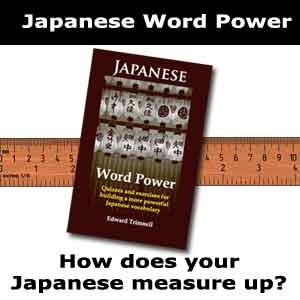
Departments
Intermediate Japanese - Free Online Course

Japanese Grammar Tutorials
Japanese verb categories (ru, u, and irregular verbs)
Now we’re going to jump headfirst into the study of Japanese verbs! In some of the other tutorials on the copula and adjectives, you learned that these parts of speech had plain and polite forms. This principle applies to all the Japanese verbs that you will study in the future. There is a plain form and a polite form.
The plain form is sometimes called the dictionary form because this is the form that appears in a Japanese dictionary (as well as in all English-Japanese and Japanese-English dictionaries written for foreigners).
For example, if you consult an English-Japanese dictionary for the Japanese equivalents of read, eat, and write, you’ll see something like the following.
read よむ 「読む」
eat たべる 「食べる」
write かく 「書く」
(In the above examples, the hiragana pronunciation is given first, followed by the kanji-based word. This is a fairly typical format for Japanese dictionaries.)
The polite form of the Japanese verb is also called the ですます体 / desu-masu-tai, or desu-masu form. You will recall that the polite form of the copula is です/ desu. Similarly, the polite form of the Japanese verb consists of a conjugation that ends in ます/masu.
For now, simply know that there is a distinction between the dictionary form and the ですます体 / desu-masu-tai. We are going to set the desu-masu-tai aside for the moment, as other work awaits us first.
Japanese verb categories: ru-verbs
Almost every Japanese verb can fit into one of two categories, known as –ru verbs and u-verbs. (Two verbs, するsuru and 来るkuru、 are irregular.) The distinction between ru-verbs and u-verbs can be made by converting the verb into its romaji form. If the resulting string of Latin letters ends in iru or eru, then the verb is a ru-verb (with a handful of exceptions.) Otherwise, it is a u-verb.
Let’s look at two examples of common ru-verbs, 食べる/ taberu (to eat) and 信じる / shinjiru (to believe). You can determine that these are both ru-verbs by first writing them in hiragana, and then converting the hiragana to romaji:
たべる → taberu
しんじる → shinjiru
Below are some additional ru-verbs:
Japanese
Hiragana
Romaji
Definition
寝る
ねる
neru
to sleep
捨てる
すてる
suteru
to throw away
掛ける
かける
kakeru
to hang; set; put up
起きる
おきる
okiru
to get up; to rise
見る
みる
miru
to look; to watch
出る
でる
deru
to go out
出来る
できる
dekiru
to be able
調べる
しらべる
shiraberu
to check; to investigate
負ける
まける
makeru
to be defeated
Japanese verb categories: u-verbs
Whereas the ru-verbs end in either iru or eru, the u-verbs are much more diverse. Below are the subcategories of the u-verbs, based on the ending:
る ru
Hiragana
Romaji
Definition
直る
なおる
naoru
to be fixed; to recover
折る
おる
oru
to bend; to break
作る
つくる
tsukuru
to make
祈る
いのる
inoru
to pray
売る
うる
uru
to sell
塗る
ぬる
nuru
to paint; to spread
つ tsu
Japanese
Hiragana
Romaji
Definition
待つ
まつ
matsu
to wait
持つ
もつ
motsu
to hold
立つ
たつ
tatsu
to stand
打つ
うつ
utsu
to strike; to beat
勝つ
かつ
katsu
to win
す su
Japanese
Hiragana
Romaji
Definition
話す
はなす
hanasu
to speak; to talk
押す
おす
osu
to push
出す
だす
dasu
to put out
直す
なおす
naosu
to fix; to repair
く ku
Japanese
Hiragana
Romaji
Definition
引く
ひく
hiku
to pull
置く
おく
oku
to put; to place
泣く
なく
naku
to cry
書く
かく
kaku
to write
聞く
きく
kiku
to ask
抱く
だく
daku
to embrace
解く
とく
toku
to solve; to untie
叩く
たたく
tataku
to strike
ぐ gu
Japanese
Hiragana
Romaji
Definition
急ぐ
いそぐ
isogu
to hurry; to hasten
泳ぐ
およぐ
oyogu
to swim
注ぐ
そそぐ
sosogu
to pour
む mu
Japanese
Hiragana
Romaji
Definition
読む
よむ
yomu
to read
飲む
のむ
nomu
to drink
進む
すすむ
susumu
to proceed; make progress
住む
すむ
sumu
to live; to reside
生む
うむ
umu
to give birth
編む
あむ
amu
to knit; to weave
ぶ bu
Japanese
Hiragana
Romaji
Definition
呼ぶ
よぶ
yobu
to call
飛ぶ
とぶ
tobu
to fly
忍ぶ
しのぶ
shinobu
to endure; to conceal
転ぶ
ころぶ
korobu
to fall down
う u
Japanese
Hiragana
Romaji
Definition
洗う
あらう
arau
to wash
買う
かう
kau
to buy
使う
つかう
tsukau
to use
会う
あう
au
to meet
言う
いう
iu
to say
笑う
わらう
warau
to laugh
ぬ nu
There is only one commonly used Japanese verb that ends in ぬ nu:
Japanese
Hiragana
Romaji
Definition
死ぬ
しぬ
shinu
to die




